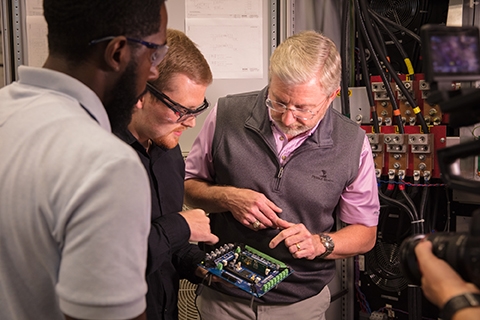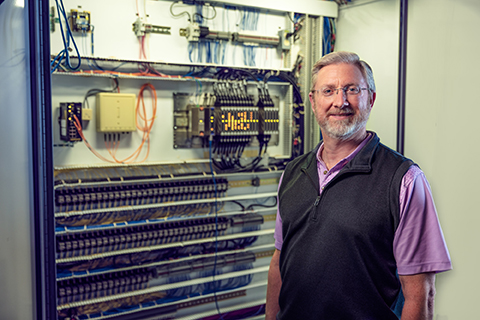Engineers to Work on Cybersecurity for Systems Linking Solar Power to Grid

Alan Mantooth, right, Distinguished Professor of electrical engineering, with students at the National Center for Reliable Electric Power Transmission.
FAYETTEVILLE, Ark. – Distinguished Professor Alan Mantooth of the University of Arkansas received a $3.6 million award from the U.S. Department of Energy Solar Energy Technologies Office to advance technologies that integrate solar power systems to the national power grid.
Mantooth and engineering researchers at the university’s National Center for Reliable Electric Power Transmission will lead a large, multi-institutional research group that will develop systems to protect solar technologies from cyberattack.
“As U.S. energy policy shifts toward more diverse sources, particularly solar, the Energy Department understands the critical importance of protecting these systems and technologies,” said Alan Mantooth, Distinguished Professor of electrical engineering and principal investigator for the project. “Our group is nicely qualified to address these problems. We’re already developing systems to protect the power grid from cyberattack, and this work will be a logical extension of that effort.”
 |
| Alan Mantooth, Distinquished Professor of electrical engineering and executive director of the National Center for Reliable Electric Power Transmission. Photo by University Relations. |
Mantooth will lead a team of researchers from the University of Georgia, University of Illinois at Chicago, Texas A&M University-Kingsville, the National Renewable Energy Laboratory, Argonne National Laboratory and General Electric. Two Arkansas companies, Ozarks Electric Cooperative and Today’s Power, will also contribute to the project.
The research will focus on developing cybersecurity systems for photovoltaic energy technology and devices, especially solar PV inverters, the power electronic devices that link solar power arrays to the grid. Researchers will address issues such as supply-chain security, real-time intrusion detection methods, identifying and mitigating vulnerable spots, control system security and safety protocols.
Their project, “Multilevel Cybersecurity for Photovoltaic Systems,” is a part of the Solar Energy Technologies Office Fiscal Year 2019 funding program, an effort to invest in new projects that will lower solar electricity costs, while working to boost solar manufacturing, reduce red tape and make solar systems more resilient to cyberattack. It will help improve the ability of grid operators to integrate increasing amounts of solar generation onto the grid in a cost-effective, secure, resilient and reliable manner.
Mantooth is the executive director of the National Center for Reliable Electric Power Transmission, the highest powered power-electronics test facility at any U.S. university. He is also executive director of the Cybersecurity Center for Secure Evolvable Energy Delivery Systems, a consortium of university and industry partners focused on protecting the U.S. power grid from cyberattacks. The Cybersecurity Center is funded by the Department of Energy and Department of Homeland Security. Its researchers have developed numerous detection and mitigation algorithms for the electric grid sector, as well as power electronics-based methods, including control boards and power routers along with software modules that control these systems.
Jia Di, professor of Computer Science and Computer Engineering; Qinghua Li, associate professor of computer science and computer engineering; Chris Farnell, NCREPT managing director and test engineer; and several students will contribute to this project.
Mantooth is an Arkansas Research Alliance fellow and holds the Twenty-First Century Research Leadership Chair in the College of Engineering.
About the University of Arkansas: The University of Arkansas provides an internationally competitive education for undergraduate and graduate students in more than 200 academic programs. The university contributes new knowledge, economic development, basic and applied research, and creative activity while also providing service to academic and professional disciplines. The Carnegie Foundation classifies the University of Arkansas among only 3 percent of colleges and universities in America that have the highest level of research activity. U.S. News & World Report ranks the University of Arkansas among its top American public research universities. Founded in 1871, the University of Arkansas comprises 10 colleges and schools and maintains a low student-to-faculty ratio that promotes personal attention and close mentoring.
Topics
Contacts
Alan Mantooth, Distinguished Professor, electrical engineering
College of Engineering
479-575-4838,
mantooth@uark.edu
Matt McGowan, science and research communications officer
University Relations
479-575-4246,
dmcgowa@uark.edu
Headlines
PetSmart CEO J.K. Symancyk to Speak at Walton College Commencement
J.K. Symancyk is an alumnus of the Sam M. Walton College of Business and serves on the Dean’s Executive Advisory Board.
Faulkner Center, Arkansas PBS Partner to Screen Documentary 'Gospel'
The Faulkner Performing Arts Center will host a screening of Gospel, a documentary exploring the origin of Black spirituality through sermon and song, in partnership with Arkansas PBS at 7:30 p.m. Thursday, May 2.
UAPD Officers Mills and Edwards Honored With New Roles
Veterans of the U of A Police Department, Matt Mills has been promoted to assistant chief, and Crandall Edwards has been promoted to administrative captain.
Community Design Center's Greenway Urbanism Project Wins LIV Hospitality Design Award
"Greenway Urbanism" is one of six urban strategies proposed under the Framework Plan for Cherokee Village, a project that received funding through an Our Town grant from the National Endowment for the Arts.
Spring Bike Drive Refurbishes Old Bikes for New Students
All donated bikes will be given to Pedal It Forward, a local nonprofit that will refurbish your bike and return it to the U of A campus to be gifted to a student in need. Hundreds of students have already benefited.




